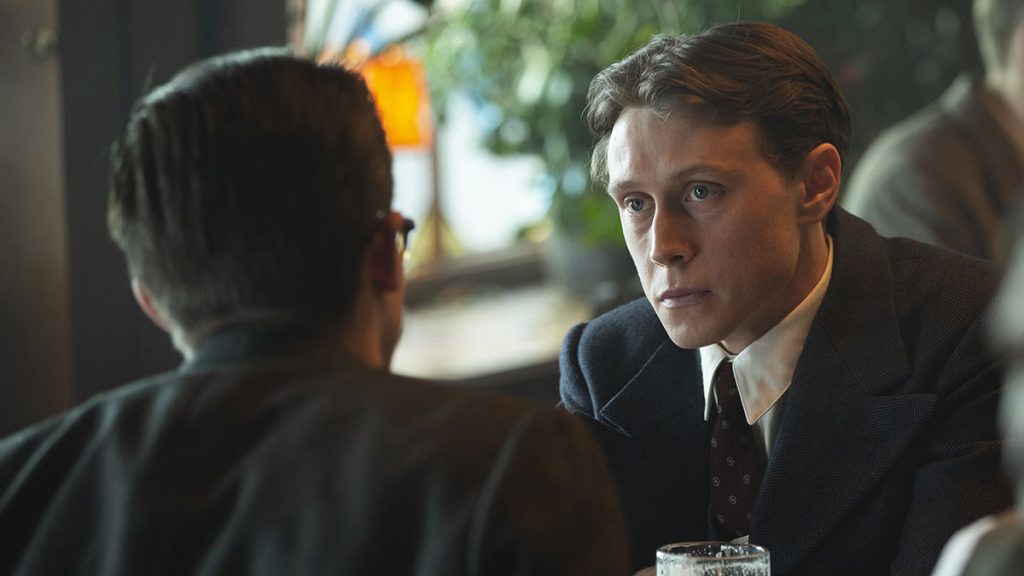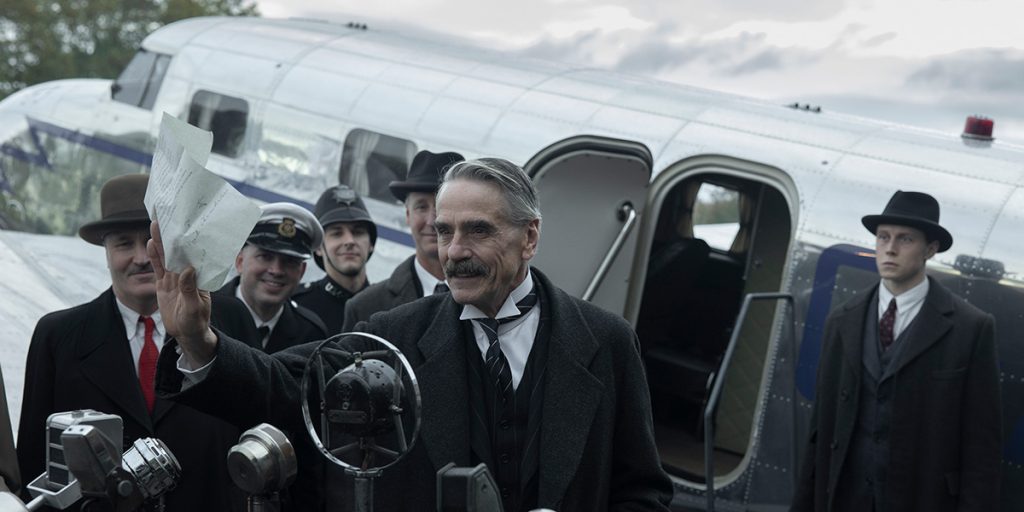WWII origin film Munich – The Edge of War works well as a political biography of Neville Chamberlain, but not as a tense espionage thriller.
History has painted Neville Chamberlain in a rather negative light. From 1937 to his resignation in 1940, the British Prime Minister tried to avoid war with Adolf Hitler’s Germany using appeasement and diplomacy. After he and Hitler signed an agreement during the Munich Conference in 1938, Chamberlain declared “peace for our time” – only for that peace to be shattered a year later. Now his legacy is tied to that broken promise and his failure to prepare Britain for WWII. If Winston Churchill won the war for Britain, then Chamberlain dragged the country into it in the first place. However, Netflix’s new drama, Munich – The Edge of War seeks to change his image whilst also providing some tense political espionage.
In 1938, tensions between Britain and Germany are rising. Peace talks have stalled, and Hitler (played here by a quietly sinister Ulrich Matthes) is preparing to invade Czechoslovakia. London is preparing for war; gas masks are being sold on the streets, and sandbags are being piled up against buildings. Hugh Legat (George Mackay) is working for the government as Prime Minister Chamberlain (Jeremy Irons) seeks a peaceful solution. When Hitler and Chamberlain agree to meet in Munich, Hugh is asked to carry out a secret mission. German diplomat Paul von Hartmann (Jannis Niewöhner) has discovered a document containing Hitler’s plan to conquer Europe, and he wants to hand it over to the British.
The plan is for Hugh to act as an intermediary and retrieve the document. But he has a personal link to this mission. He and Paul used to be mates, having attended Oxford with Paul’s girlfriend Lena (Liv Lisa Fries). However, they have not spoken since 1932, when Paul’s fanatical support for Hitler caused their friendship to dissolve. So, what has changed? Why is Paul suddenly plotting the Führer’s downfall whilst working for his government? And what has happened to Lena? With negotiations continuing, Hugh will have to find out whilst recovering the document and dodging German officers that include Franz Sauer (August Diehl).
There is an intriguing political biography hidden in Munich – The Edge of War. German filmmaker Christian Schwochow (who directed two episodes of Netflix’s The Crown) follows Neville Chamberlain for part of the film as he tries to achieve peace in Europe. Having seen the pain and suffering caused by The Great War, the Prime Minister is determined to, as he says, “do anything, sacrifice anything to maintain the peace.” Jeremy Irons is brilliant here, playing Chamberlain as a grander, wilier and more benevolent figure than history has suggested. It is an incredibly positive portrayal that represents one of the film’s key themes: advocating for peace by any means.

On the other hand, Munich – The Edge of War is full of elements and stories that could be their own films (or episodes of a TV show). Irons’ Chamberlain is one part of the film. Another is Hugh and Paul’s spy work, from their clandestine meetings to the secret concealment of the document. Except, this story of espionage (which is entirely fictional – both here and in Harris’ novel) is not as compelling. It could be the dramatic irony of the film where we know where Europe will end up just one year later. It could be that Paul’s change in political ideology is sudden and unseen. The reason he goes from forgiving Hitler’s bigotry to fighting his rule is only explained in the final third. Either way, the film is neither tense nor nerve-wracking.
Playing Hugh is George MacKay (1917), who has become one of the most reliable young actors of the moment. However, although he, Niewöhner and Irons all give great performances, they are the only cast members who are given something to do. Jessica Brown Findlay (Downton Abbey) is sadly neglected as Arthur’s wife, a character used solely for a forgotten storyline about Hugh’s family problems. The same goes for Liv Lisa Fries; Lena is key to the relationship between Hugh and Paul, yet she only appears in a couple of scenes. In fact, all the female characters get shafted out of the story – whether it is Sandra Hüller as Paul’s co-conspirator (and lover) or Anjli Mohindra as no-nonsense British secretary Joan. Moreover, the reveal of Joan’s role in the mission is almost ridiculous.
Munich – The Edge of War is a decent WWII drama, although, at 131 minutes, it is overly long. MacKay and Irons are superb, but most of the characters are a little underdeveloped. However, the main problem is the conflict the film has with itself. When it wants to be a spy thriller, there is no real sense of tension to proceedings. When it is about Neville Chamberlain, it becomes really interesting (and the film suffers when it focuses more on Hugh and Paul in the second half). As a combination of these two stories, Munich – The Edge of War is good but could have been more engaging.
Munich – The Edge of War was released in select theatres in the United Kingdom and Ireland, Australia, New Zealand and United States in December 2021, and on Netflix everywhere January 21, 2022.

